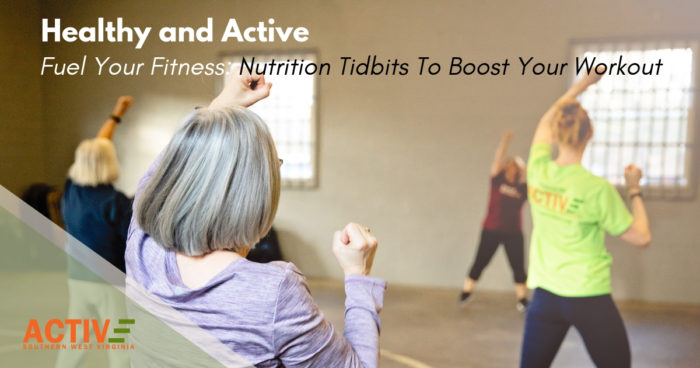
It’s National Nutrition Month, a campaign each year in March to celebrate and highlight the importance of making informed food choices, develop healthy eating patterns and physical activity habits. Today, I want to give you some insight into properly fueling your body to move more. Our bodies are made to move and when we get moving, we feel better. Our metabolism revs up, our circulation and oxygen improve, we become stronger and more mentally clear and we get stronger and build confidence -it’s a win-win! But we need to fuel efficiently, so we have enough energy to get up and move. Here are a few of the most common questions about nutrition and physical activity.
Protein equals muscle, right?
Although, protein is one of the key building blocks in muscle mass, it will not miraculously make you stronger. The only way to increase muscle or preserve it, is to move those muscles more. Use it or lose it! Muscle loss can happen as early as 30 years old, but with proper nutrition and physical activity you can avoid and even reverse age-related muscle loss. We offer FREE opportunities to build and maintain those muscles, such as aerobics, hiking and running groups, find more information here.
Most people get plenty of protein through their diet and don’t need a supplement. Actually, consuming too much protein can be harmful to your health and put additional strain on your hardworking kidneys.Carbohydrates are the key to fuel your muscles. The body converts carbohydrates to glycogen, which is stored in your muscles to power your physical activity.
A healthy amount of protein is .8-1grams of protein per kilogram of body weight on a daily basis. So, a 175 pound-person would need about 64g-80g of protein daily. Of course, this is not a set number for everyone, just the average individual. If you have kidney disease or if you’re a serious weight lifter your needs would be a bit different. We all have individualized needs and it’s important to consult a registered dietitian, who is an expert in nutrition to receive valid and up to date advice.
Here are some good sources of protein to get you started:
- 3.5 ounces of lean chicken or salmon (31grams and 24 grams respectively)
- 1 cup of Greek yogurt (17g)
- 1 cup of skim milk (9g)
- 1 cup of beans (18g)
Should I workout on an empty stomach?
Your body needs fuel to move, especially if you want to hike, run, swim, dance or lift weights. Listen to your body, some people can eat right before they participate in physical activity and some people need time to digest and allow their stomach to settle (1hr or more). Experiment and see what works for you. Make sure you’re fueled up for the amount of physical activity you’ll be doing. For instance, if I’m going out for a short run, I’ll grab a piece of fruit before heading out. If it’s a longer workout (more than an 1hr), I’ll have something more substantial to keep me going. Here are a few suggestions:
- Peanut butter and banana sandwich
- Greek yogurt with berries
- Fruit and nuts or nut butter
- Handful of your favorite nuts and some raisins or craisins
Notice that all these include protein and carbohydrates. Carbs are the fuel, and protein rebuilds and repairs. Its important to include both to help give you the energy and stamina you need.
Do I need to consume sports drinks?
Water is your best friend when it comes to hydration status. There’s nothing special about sports drinks. They actually contain copious amounts of sugar that most of us don’t need and can cause gastrointestinal discomfort and put a kink in your activity. Although, if you’re a runner, cyclist or participate in moderate-vigorous physical activity for more than 1 hour you may need some carbohydrates to maintain proper blood glucose levels and prevent bonking. In this case a sports drink may be a good option to replenish electrolytes, but typically water is best to quench your thirst and promote hydration. The Active SWV Bridge day 5k is a great opportunity to hydrate, boost your physical fitness and support our Kids Run Clubs.
Can I eat whatever I want if I workout on a regular basis?
This is a myth. You can’t out work a bad diet. For someone who participates in physical activity for an hour or less, a healthy balanced diet is recommended. If you’re participating in strenuous activity, recovery nutrition is necessary and adjusting your calorie intake would be helpful. But for the most part we overestimate the amount of calories we burn. For those who need a bit more calories a favorable and tasty combination is chocolate milk. Chocolate milk has been deemed as an effective recovery aid post-workout because it has a great combination of carbohydrates and protein.
If your looking for a place to boost your physical fitness and put to use some of these nutrition tidbits to boost your work-out, check out the free physical activity opportunities we offer, https://activeswv.org/monthly-program/.
*If physical activity is new for you, its recommended to consult your physician or health care professional to determine if it’s right for your needs.

